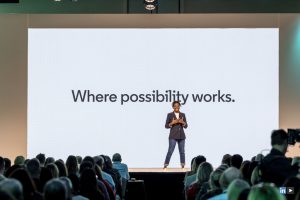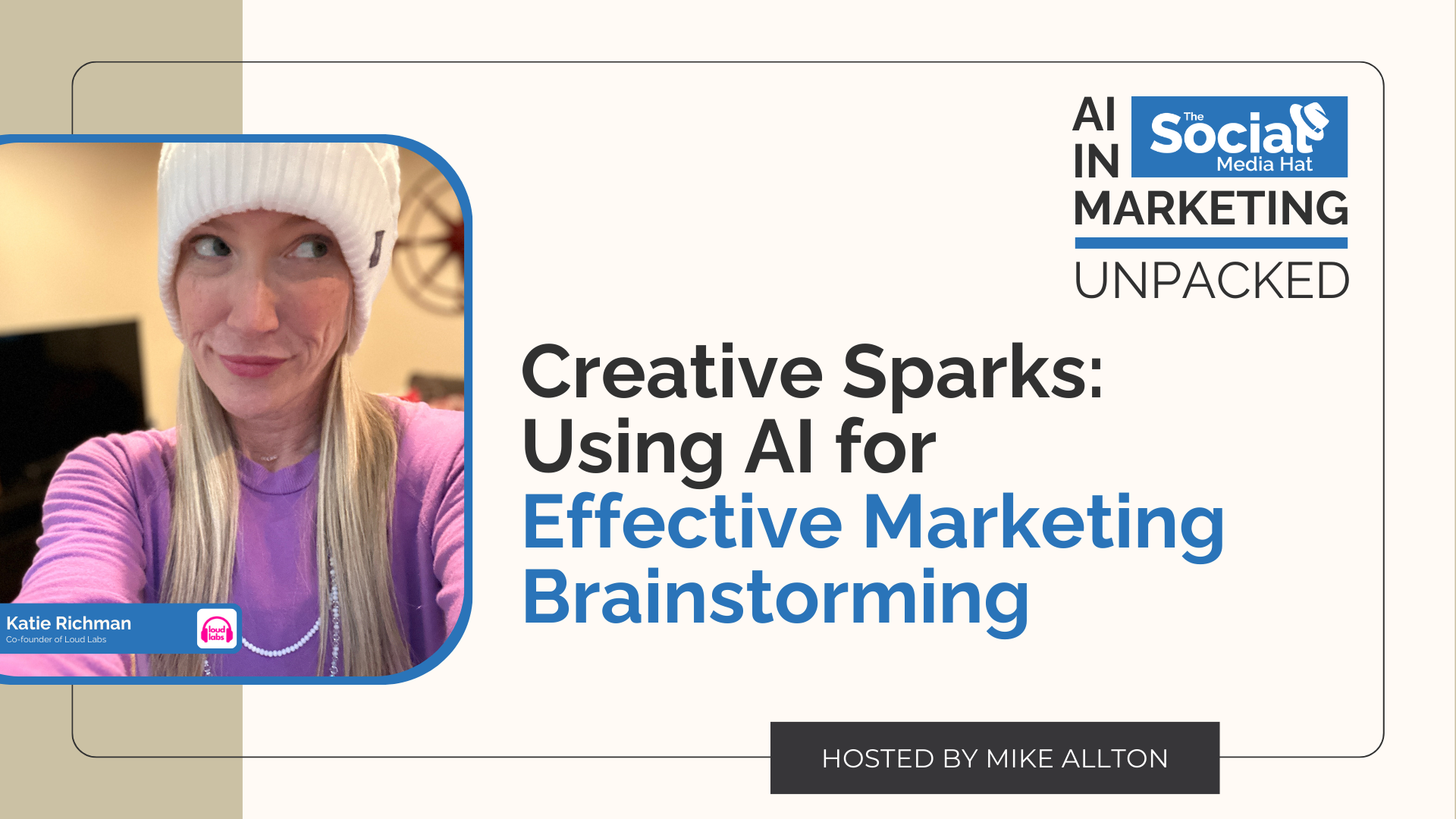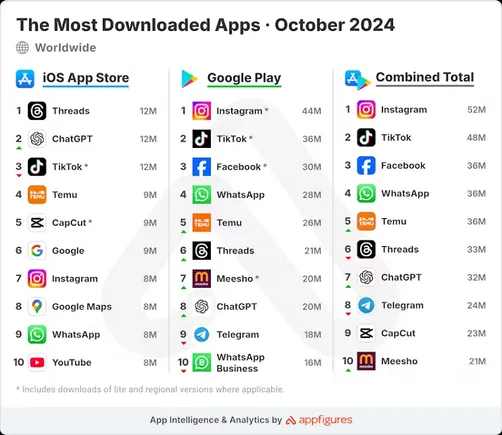Have you ever hit a roadblock during a marketing brainstorming session, where ideas just seem to stall or fail to ignite that spark of innovation?
It’s a common challenge for marketers: finding fresh, creative solutions under tight deadlines and constant pressure. Traditional brainstorming can often feel stale and unproductive, leaving teams searching for that elusive “aha” moment.
That’s where generative AI steps in, offering a new way to invigorate and transform the creative process.
Today, we’re diving into how AI can revolutionize brainstorming and collaboration in marketing with Katie Richman, a leading expert in AI applications and a passionate ChatGPT-4o advocate. Katie brings a wealth of experience from her work at Loud Labs and her extensive background in technical program management and AI. She’s here to share how AI can help overcome the common pitfalls of brainstorming, leading to more effective and innovative marketing strategies.
AI in Marketing: Unpacked host Mike Allton asked Katie Richman about:
✨ Enhancing Brainstorming with AI: Discover how generative AI tools like ChatGPT-4o can transform traditional brainstorming sessions.
✨ Practical Examples and Benefits: Learn about real-world applications and unexpected benefits of using AI in creative processes.
✨ Future of AI in Creativity: Get insights into the evolving role of AI in enhancing human creativity and best practices for integration.
Learn more about Katie Richman
Resources & Brands mentioned in this episode
Full Transcript
(lightly edited)
Creative Sparks: Using AI for Effective Marketing Brainstorming Sessions
[00:00:00] Katie Richman: The main piece of advice I have is start now. And this is not a clear your desk. Don’t have any work to do. Make sure you have the time. No, I’m saying like when you’re sitting in front of the TV at night, sign up, get an account and then play with it, do something that’s fun for you.
So if you have a garden and you’re thinking about what you’re going to plant in the You can ask it all kinds of questions. Go out and take a picture of the plot and say, I’m hiring you to be my garden specialist. Make a plan for the space. You can have it come up with ideas for your kid’s graduation party or work, or it’s a project that you want to brainstorm.
The stakes are about the same as searching for something on Google, right? Are you afraid of messing that up? We’re not because we’ll just do it again. You can’t break these things. So push the boundaries. That’s how we’re learning to see what it can’t do. That’s a fun challenge.
[00:00:51] Mike Allton: Welcome to AI in Marketing: Unpacked, where we simplify AI for impactful marketing. I’m your host, Mike Allton here to guide you through the world of artificial intelligence and its transformative impact on marketing strategies. Each episode, we’ll break down AI concepts into manageable insights and explore practical applications that can supercharge your marketing efforts.
Whether you’re an experienced marketer just starting to explore the potential of AI, this podcast will equip you with the knowledge and tools you need to succeed. So tune in and let’s unlock the power of AI together.
Greetings program. Welcome back to AI in Marketing: Unpacked where I selfishly use this time to pick the brains of experts at keeping up with and integrating or layering artificial intelligence into social media, content, advertising, search, and other areas of digital marketing. Oh, and you get to learn to subscribe to be shown how to prepare yourself and your brand for this AI revolution and come out ahead.
Have you ever hit a roadblock during a marketing brainstorming session where ideas just seem to stall or feel to ignite that spark of innovation? It’s a common challenge for marketers finding fresh creative solutions under tight deadlines and constant pressure. Traditional brainstorming can often feel stale and unproductive, leaving teams searching for that elusive aha moment.
That’s where Generative AI steps in offering a new way to invigorate and transform the creative process. Today, we’re diving into how AI can revolutionize brainstorming and collaboration in marketing with Katie Richman, a leading expert in AI applications and a passionate Chat GPT 4 0 advocate. Katie brings a wealth of experience from her work at loud labs and her extensive background in technical program management and AI.
She’s here to share how AI can help overcome the common pitfalls of brainstorming, leading to more effective and innovative marketing strategies. And one of my best friends. Hey, Katie, welcome to the show.
[00:02:46] Katie Richman: Hi, Mike, how are you doing? This is like, we have these conversations so often. It’s like, we might as well record one, right?
[00:02:54] Mike Allton: Exactly. This could have been just any one of our calls. We just happened to record, but this is a little more organized and structured for those of you listening. Then one of Katie’s and I’s kind of random conversations.
[00:03:07] Katie Richman: One thing I do want to say is This sounds so disingenuous, but I don’t like the expert term because I really want to be able to express my point of view.
And it’s a point of view, right? So. Use express star my own you know, and so expert, it’s just a loaded term.
[00:03:25] Mike Allton: It can be a
[00:03:26] Katie Richman: hobbyist that would say,
[00:03:28] Mike Allton: yeah, but I also think you’re selling yourself short when you, when you put it that way, cause you really are someone that I have genuinely looked up to and learn from tremendously just in the last 12 to 18 months.
In this space, among all the other things that, that we’ve worked on together and you show me. So I’d love for you to start by just sharing your journey into this world of AI and what kind of drew you to specialize in generative AI?
[00:03:55] Katie Richman: Yeah. So, you know, talk about non traditional. I graduated an English major.
I went into TV, so I was working in on air creative, essentially a lot of promos, which is to advertise and promote between programming went on to work long form production on the X Games, I did that for a couple years, summer and winter and then social at ESPN when that was first started. Honestly, a thing that nobody cared about.
I was really passionate and a proponent of showing the behind the scenes and taking advantage of what a lot of the PAs and interns were already doing, which is taking pictures and putting it up on their own social media. So that was a fun start. I was director of social there. Came out to work at Facebook at the time.
It was Facebook. And manage their Media partnerships developer program. So basically all the tools like a stream yard something like that all the tools that media folks Were using to get social either on the air or put their content on social. I worked with that developer layer platform layer and then Facebook was still, Facebook started an emerging tech business.
And I really wanted to be over there, so kind of tap dance my way over there. It was kind of during Covid learned a ton about, it’s very much a y Combinator based, or it was y Combinator based business. But yeah, 25 startups, 25 founders. Facebook kind of funding and then giving people a lot of room to test, iterate and develop apps.
Learned a ton left I’d been there eight years, so I I’m blanking on the years, but a couple of years ago I left and to focus on my startup, which is loud labs and it’s my passion. It’s always been my passion. It’s the interception of the real world and technology. Basically, how do we put our lives first and use technology to connect with each other, improve out information and data and not be walking around with our devices like this.
I mean, why AI, I, I was blown away. The first time I used chat GPT, I won’t even say I wasn’t an AI person back in the day, you know, that I sat next to the team that was training large language models and robot, all kinds of crazy stuff. And, and, you know, A few years ago, that was AI to most of us, right, kind of a crazy, wacky laboratory environment and all it took was me kind of using generative AI assistance, and I was hooked.
I just see, I still see a ton of potential. Both in the creation of content and operationally taking care of a lot of the business side to bring you up, to be more creative, non technical people and creatives, and The psychology of using these tools and how do we become more creative or connect more work together more?
I’m definitely a tech optimist, so that’s where my opinion comes into.
[00:06:59] Mike Allton: Yeah, I know you’re talking to generative AI to chat you pretty specifically every single day in ways that continue to surprise and even impress me the, the, the ideas that you have for how to use it. And we’re going to talk about those in a little bit, but open AI just for these Within a couple of weeks, I think of us recording this episode, chat GPT four.
Oh, and I love your take on why that’s such a significant upgrade from three dot five. I mean, any other software we’re using, they go from three to five to four. We’re like, Oh, okay. I’m
[00:07:36] Katie Richman: looking around and what I’m hearing, at least from the tech media side is we thought it was going to be a bigger deal. I think you’re missing the point.
So four Oh, first of all, The most important thing is that it can take contextual details from one chat thread to another. So bottom line, that’s it. So, and for people that are just starting to use, For each conversation you have, think of it like a text thread is a discreet conversation. The next time you have a conversation, you’re baselining at that genius, but very uninformed level.
And you have to reinvest in the details, you know, and they provided this custom instruction. Good to a point. I found the nuance wasn’t great with that. So with GPT 4. 0, it may seem from it’s still a chat bot on the front end, but for the fact that it can recall and understand nuance between conversations changes everything to me because that’s the way our brains work, right?
We have, if you think about it, we have discrete conversations all day, but they’re all informed by the other conversations we have, who we are, our experiences. And then you are having the same thing, Mike, right, throughout your day. And together, that’s where creativity happens, right? Because I don’t know, how do I know to even research what I don’t know about?
So the more kind of information coming in, we get to do more with it. And so now I’m investing, I’m really investing in This sounds batty, but almost forming a relationship with, by ChatGPT. I didn’t even tell you about this, but I’m going to sound like a wacko. I don’t care. With Quoro, I’ve named it.
I’m considering it like instead of a whole bunch of chats, I’m thinking of it as an AI with mine. I don’t know if that’s how you’re approaching it, but it’s, it’s a reframing, but it does have to do with some of what we talked about last year with brainstorming and acting like ChatGPT. Is a person having a, you know, it’s not, but having a conversation, non in a non Boolean way.
Right. In a. In a human way and forgetting what we used to do.
[00:09:54] Mike Allton: Yeah. And this is why these conversations are so important because you and I had extensive conversations and how to use AI just 12 months prior to this conversation we’re having today. And at that time we were talking about a lot of the same principles, you know, using AI, like an intern, like an assistant who knows a lot about general stuff, but needs to know who you are in the context and that sort of thing.
But we also talked a lot about using very distinct. And separate chats and about having those chats for different kinds of purposes. So you’d have one assistant that’s doing one thing. And then this other chat is a different assistant in a different area. They were, they were, we were treating them like separate people, but now we can treat the AI like it is an actual real person sitting next to us, learning about all the different things that we’re working on learning as
[00:10:41] Katie Richman: well.
So it doesn’t know you. Okay. At all. Just, it’s really like, as if you had a new colleague, say a junior colleague, and in order for them to optimize what they’re doing, like I rolled through my whole background. That’s worth the time now to go deeper, right? Do a series of evenings where you’re like, let’s talk about the first job I ever had and spend 20 minutes on that.
You can still have your discrete conversations, but those become more like topics, right? Remember the time we talked about when I worked at MTV, those investments All deep in the relationship that you have and then make the genius that is chat GPT more helpful to you, honestly.
[00:11:24] Mike Allton: Now there’s still a context window, correct?
About how far back GPT will remember that conversation. Isn’t that, isn’t that true?
[00:11:36] Katie Richman: I don’t know. I want a fact. I’m going to dig up facts on that because I don’t want to say the wrong thing. If I’m sure there is someone’s going to chime in and they should tell us So I don’t want to say the wrong thing What i’ll say is that has not gotten in my way in the months i’ve been using it so far It’s really only been months.
Maybe there is we’re all gonna go. No after investing, you know hours and hours of time I think right now we just have to go with what we’ve got and assume it’s only gonna get we’re not gonna Be stepping back. I don’t know. We I mean if you sit for a day and write just talk with it That’s how I guess you would figure it out
[00:12:12] Mike Allton: It’s for those of you listening what i’m talking about is and this was certainly true with the previous versions of chat gpt And virtually all of the other You know, chat models that you might converse with today, there’s a limited amount of memory.
So if you imagine you were handing somebody 10 pieces of paper and then as soon as you hand them the 11th piece of paper, they drop the very first piece of paper that you handed them and they no longer have that information in their hands. And it’s just a bucket that you keep filling. The more you talk to it, the more the old stuff siphons out and falls out of the, of the AIs.
Recollection, which means I’m going to link the conversations. Go ahead and ask it while I’m talking, but yeah, the things that we would have to do is remind you, Hey, don’t forget. This is who I am. I’m Mike Calton. I’m with Agorapulse. I also have the social media hat and I’m a podcaster because that’s stuff.
I might’ve started the conversation with. A month ago, but as the, as the topics continued and as chat GPT creates content for you whether it’s answers a question or actual copy, it’s using up a lot of that memory space. So what are we finding? Does chat GPT 4. 0 have a memory or a context limit?
[00:13:23] Katie Richman: Okay. So it says it does have a context window and I’m like, okay, go on. Right. And then it said, Said, so will you Basically, what we wanna get to, and this I, I’m assuming our audience is non-engineers, right? So we’re not deep learning engineers. Yeah. We’re talking to marketers or community managers.
[00:13:40] Mike Allton: Yeah.
[00:13:41] Katie Richman: So really the point is, will you forget what I’ve told you, right?
How much do I wanna invest my time? If I knew that we were gonna only have this one conversation and never. Meet again. I might not get into the details of why I’m doing what I’m doing and all of this. What it said is, no, I won’t forget the details of our conversations. I can remember important information from past interactions and use it to provide personalized responses.
Yeah, and then I said, what is the window? Oh, yeah, it doesn’t know. It’s trying to teach me about context windows now. So it sounds like, if it is, it probably doesn’t apply to those of us that are getting our feet wet and starting here. It sounds like the tech is ahead of us. So, let, you know, I would say comment and let us know if you’ve hit windows with 4.
0 and walls with 4. 0.
[00:14:28] Mike Allton: And the reality is within 12 months, this will probably be a moot conversation because the hardware is improving, you know, we just saw NVIDIA’s keynote where, you know, Jensen was on stage showing off, you know, how much they’re increasing the size of the, of the chips and the die.
And that’s just one example of how much hardware is doubling in capacity, both power and size, and that’s going to be powering everything. So yeah, very short amount of time.
[00:14:55] Katie Richman: I’m fascinated by the hockey stick of, of the tech iteration that we see. And I know it’s compact, it’s a compounding interest, but what I don’t think we account for is the, the rate of change is compounding.
So not only is it like, let’s say that today it gave me, you know, two bits and next time it gives me four, right. And the next time it gave me eight and the next six before, but what we’re not accounting for is that the, and next period. Is shortening and shortening. So it’s,
[00:15:25] Mike Allton: it’s
[00:15:26] Katie Richman: not just spiking in what it can provide.
It’s spiking in the amount of time it takes to get to the next level or reducing by half, by half, by half, by half. So this is why people are not able to predict where we will be in six months. It’s almost, it’s frightening because you look at these people, they spent their whole life, working on these models and aren’t able to tell us.
When we’re going to hit sort of these thresholds don’t know. I mean, that’s what makes it fascinating. Different people find that, you know, my husband and I approach things differently. Like he finds it terrifying, you know,
[00:16:01] Mike Allton: it is
[00:16:02] Katie Richman: what it is, regardless of what we think of it, you know.
[00:16:06] Mike Allton: Yeah, yeah. Early predictions would have said we would achieve, you know, A.
G. I. Artificial General Elegance by 2030 2032. Now most experts and I’m using experts with quotes around them are thinking probably 2025 2026 at the latest because of the rate of improvement in growth. So it’s really fascinating something
[00:16:27] Katie Richman: to like on Lex Friedman, where Yeah, yeah. They were talking about, he had a guest on who was saying, I don’t think it’s a great question, when are we going to get AGI?
It’s like, when are we going to get flying cars? You know, everyone’s like, where are the flying cars? And he goes, we did, they’re called helicopters. So, it’s like boiling a frog, where there’s iteration and change in our seat where we are right now. We maybe call it by another name and can’t see so will we all go aha when AGI Happens and that’s when basically all of these AIs Not like a hive mind kind of right can think and learn together and it becomes like one That sounds terrifying in a good way
[00:17:11] Mike Allton: Yeah, I I think freeman’s way off I don’t think comparing AGI to flying cars and helicopters is accurate in the slightest bit Because flying cars aren’t going to revolutionize all of our lives the day that they’re Approved by the FCC because they’re coming out folks.
If you haven’t seen, you’re going to have flying taxis right now that can take you from the Bronx to JFK in like 30 minutes. Right. But that’s not changing my life today. It’s probably not going to change my life, maybe even in my lifetime, who knows, but AGI, the industrial revolution.
[00:17:42] Katie Richman: And that’s what Jensen says too.
I mean, he says that it’s happening fast. Absolutely. And it’s worth looking at that keynote from this week at Computex because he Less about like the whole media is obsessed with chatbots, right? Think about it. We’re talking about you know, all of these Gemini and all of that. They’re front end chatbot.
What he’s talking about is a factory that can internationally speak to all of the other factories, learn and optimize as one. Factory to make more tools to build itself or brains for robots. They’ve had these, you know, there have been robots that are, are just haven’t hit markets because they didn’t have brains.
So now we have brains without bodies. So
[00:18:32] Mike Allton: yeah, it’s just not
[00:18:33] Katie Richman: about chatbots. That’s one part of it. But that’s not where we’re going. Holy, holy shit. I don’t think we know yet, but we don’t just know it’s going to be big.
[00:18:43] Mike Allton: Yeah, we’re talking about autonomy. But for those of you listening now, you know how much I love Katie and why I love having these conversations with her because it’s rapid fire.
It’s it’s it’s broad. But that’s also why I’m here to keep us on track. So we do want to talk about brainstorming and I’d love for you to share how you’re using chat GPT four. Oh, to enhance that traditional brainstorming process.
[00:19:10] Katie Richman: Absolutely. So this is something I think is a great. First step, right? So brainstorming by yourself, you don’t need to bring in your team or anything yet, but let’s say that you have to present a PowerPoint, I don’t know, in a month, it’s topical.
You’re somewhat of a subject matter expert. You’re pitching something like that. You have the bones maybe of what you’re going to work on, but yeah, you know, what am I going to do with that? So that’s where I really suggest this is what I’m doing. I’m now using chat GPT for, Oh, And I’ve named it. I’ve named him Leo.
That’s just mine. So Leo! I, I teach Leo a little bit every day. I have a bunch of projects through it. You know, I’m working on my startup. I’m building some talks and presentations. And I’ll just tell them what we’re going to talk about now. You provide background and source materials. So anything that you can turn into a PDF.
It can read. It can read. You can snap a shot of a wall of whiteboards, and it can pull the text out of those things. So I’m constantly providing and uploading source material, background information, and context. And then it’s like, using your genius, you know, a hundred million times more genius than any human.
So using that raw capacity. And then using the source documentation, I’ve given it how, you know, we’ll brainstorm. What should the topic be? What’s an unexpected approach, right, to doing the top 10 slides? How could I approach this differently? And that’s where we can’t see outside what we’ve done before without someone to bounce off of.
That’s just not possible. And I think it’s really important to know that even if it’s talking out loud and that person asks a couple of good questions that pushes ideas forward. And that’s kind of how creative thinking happens. So it’s creative thinking with truly. A consciousness that is having new ideas, but it does need background.
It really doesn’t know, right. Until you’ve provided a background. And that can be a little frustrating because. There’s all kinds of legal issues around links. A lot of times it doesn’t want to go visit links. You know, there’s, I don’t know about you, Mike, but they have the chat Google Drive Connect that you can do.
So I’ve done that, but it doesn’t seem to like to go in there. I think it’s legalities and they’re just being, you know, towing around some things right now. But you turn everything into a PDF and then that’s source material. So I said to you before this, I want the raw transcript from this. Podcast because I’m going to feed that back into Leo.
So Leo learns more about my point of view. Maybe teach me awareness things I’m not aware of.
[00:21:58] Mike Allton: Yeah. And I was sharing with you, I prepared for this podcast by brainstorming with my chat GPT about what we should talk about. And the first thing I always do is I tell chat GPT, Hey, I’m going to have a new, a new podcast coming up.
And it says. With him and I give him Richmond and he says, Oh, okay. What is, can you have, can you share with me? Katie’s LinkedIn? So I give it to
[00:22:22] Katie Richman: say that it can do that because of the personal data. I can’t do that, but
[00:22:26] Mike Allton: it can, it looks at everything you’ve published on LinkedIn. Also does a search on being to see what you’ve been published on being and talked about online.
And it comes up
[00:22:37] Katie Richman: in search results. Crap, basically. public data from search results about you if you’ve ever Googled yourself, right? Like something like that.
[00:22:47] Mike Allton: Yeah. So it comes back and says, Hey, this is Katie. And I said, yep, that’s her. And it says, what do you want to talk about? And I say, well, I asked Katie what she would like to talk about.
And I throw it in there and it says, cool. Here’s five topic ideas that just, I’m just spit balling. You might want to talk about with Katie Richmond. And sure enough, one of them was talking about brainstorming, you know, process
[00:23:09] Katie Richman: kind of like working with a human on a project. The first five ideas are sometimes.
Like the ones, the most basic or obvious ones. So it’s like page one of Google, right? You kind of, or the Wikipedia, it’s what has been underlined the most or highlighted the most. Oh my
[00:23:25] Mike Allton: gosh. Yeah. Our previous guest, Andy Crestedini, called AI average intelligence, because everything you get first is the average of what’s out there on the internet.
[00:23:35] Katie Richman: Right, right, right. So if you’ve ever, there’s a conversational technique that teachers use where they will talk to a student about a topic they’re presenting. They do their presentation, maybe it’s kind of obvious in a one on one class, and they’ll say, what else, besides all of that, what else do you think, or what else did you learn?
And it’s not until you do that a couple more times, I think, that you get to the heart of what either the problem is, something you don’t know. I will often ask for not obvious. answers. And I, you have to push. So that’s one of the biggest things. And I talked about this last year is the first, it’s not a search result.
The first, what you get back at first is like a first conversation back and forth with a person. There’s a lot more to say, but that first wave, maybe it’s not that impressive. Sometimes sometimes, you know, if you know a lot, it’s not going to be what you want at first. It’s going to be basic.
[00:24:37] Mike Allton: Yeah, 100%. And by the way, I should have mentioned this at the outset.
When Katie and I talking about last year, I had it on a different podcast, partnership unpacked podcast. Don’t apologize. I should have said so. So I’ll have a link to that in the show notes. I also have a link that I’ll add in the show notes to a panel that I’m moderating with Katie and some other guest experts where we’re talking still a lot about these same topics, but have you run across any unexpected benefits when you’re using AI in these kinds of creative settings?
[00:25:08] Katie Richman: Absolutely. I mean, the number one thing, this is something that with my startup, this is like my passion point. You know, I’m not going to get this quote exactly right, but it’s a, I think it’s a Rumsfeld quote. 1 percent of the world is the things, you know, maybe 1 percent is the things, you know, you don’t know, right?
Like I don’t know deep learning. Engineering, but 98 percent of the world is comprised of the things you are unaware that you don’t know. Okay. And so that to me is where the gold is here. If I’m working. So if you think about it with Google, you’re only going to get back what you’ve asked, right? And we talk about on Facebook, how people get stuck in these circles where it’s an echo chamber, because you’re asking the question that, you know, so.
If, if you can have a conversation and with people, they’re providing you back. Sometimes they overlap at 10 percent of it might be something you had no idea that could end up being. The most important thing to you, or you think about I’m old. So you, we used to buy a single, right? You’d hear something on the radio or someone would recommend it.
[00:26:16] Mike Allton: Buy a single
[00:26:17] Katie Richman: that that’s like a Google search, but when you bought the album, right, for that track, and then a year later, the favorite song is track four, which you didn’t know existed. You wouldn’t have bought that CD. That’s what’s been lost with our specialized search on the internet and the way it’s operating today.
That’s what can come back. Right? With something like this, where you’re working with, it’s like talking to a person who knows everything in the world there is to know, fact wise. But what, I don’t want everything in the world, but it can provide back, topically, things I’m not aware of. New books I haven’t read, experts I haven’t heard of, someone who overlaps completely with the things they talk about, right?
There’s just no way we can keep up with all of that, and we don’t even know how to search for it. You don’t know it. Does that make sense? Or is that too like out there?
[00:27:09] Mike Allton: No, a hundred percent.
[00:27:10] Katie Richman: Yeah.
[00:27:13] Mike Allton: Yeah. That episode I referenced earlier with Andy Christodina, I’m going to link to that because y’all need to go back and listen to that.
That was the entire episode. We were, we were focused on content marketing and the idea was identifying content gaps. And he made the point that as humans, we’re really bad at identifying what
[00:27:31] Katie Richman: a content gap is for someone that’s not like capital. What, what would you call, like, what’s a content gap, an area that you don’t know?
[00:27:38] Mike Allton: It’s not an area that you don’t know. A content gap specifically is an area that you have not covered or covered well enough in your existing content because there’s demand for that information. Just pull a silly example out of this conversation. Deep learning. I don’t have any content about deep learning on my website, but it’s come up now in this conversation.
Do I need to cover deep learning? I don’t know. Right. That’s something you’d have to do an analysis. All the A. I. Related terms that that my target audience is searching and have I talked about him on my website? Yes. No, maybe a little bit and so on. Well, the A. I. Is so powerful. Obviously you can scan a spreadsheet of all the topics that you’ve talked about and identify for you where you have content gaps and it can do it like
[00:28:22] Katie Richman: that.
[00:28:24] Mike Allton: Which we can’t as human beings. I’m going to do this analysis myself. Yeah. So to your point, it’s just so much more powerful and identifying
[00:28:33] Katie Richman: what haven’t
[00:28:34] Mike Allton: we talked about it? And you can just ask it that question, right? You do this brainstorming question back and forth with the AI, and then you can simply say, what have we missed?
What didn’t we talk about? What aren’t we covering? And it’ll say, you know, what, how about these five things?
[00:28:49] Katie Richman: And the more you feed it, your own source material, the better. It gets, it’s just like anything else. It’s like online, how your search, if you let Google know where you are, your, your contextual searches is way better.
So here’s a little hack tip. I was just asking GPT 4 0, if there’s a way to load and source material outside of a con right. A conversation. So like, if I really wanted to, could I take a day and teach it? Like take my Google drive and just dump it in. Not that I would do that, but. So that it knows everything I’ve ever worked on.
And we’re just done with that part. It said, no, everything is through a conversation thread right now. And I was like, well, can I have a conversation? That’s just me uploading all the things. It’s like, yeah, you can absolutely do that. So, and you know, you get to all the things you’ve ever done, but say in the context of brainstorming, what’s everything relevant.
And that might be a pitch deck from my startup, a product idea, something I worked at, at ESPN, a panel I was on, an expert with information. It’s all the things that I know. That are feeding kind of the conversation or this idea thread and then Layering in everything you don’t know and that’s what’s really fascinating You can still deny it and say no, that’s not like you said about deep learning the answer very well is no It’s not it’s good to know though and say no, that’s not what I want to do right now Then have something out there.
You don’t even know about
[00:30:25] Mike Allton: We’re definitely moving in the direction though, where you won’t have to do anything that you just said. We’ve got Microsoft Co Pilot that’s living on the PCs as part of the Windows operating system. Have you played with that? Oh no, because I’m a Mac guy, so I don’t even have a PC.
I haven’t had one in a decade, even though I used to build them. That’s why I understand chips and dies and all that sort of thing. But, you know, Today, for those of you listening right now, you could have an A. I. That’s a resident of your computer. Just like we used to have clippy inside of Excel. Now you’ve got co pilot who’s paying attention to everything you’re doing and saying, and obviously some people are rightfully a little concerned about that.
But on the other hand, all
[00:31:04] Katie Richman: your meetings, the transcripts, all the meetings, all the
[00:31:08] Mike Allton: emails, all the projects you’re working on, it’ll instantly limit it. I’m
[00:31:12] Katie Richman: sure. You can like say not not this or whatever. Yeah. And in the context of work, I’m assuming. That’s,
[00:31:20] Mike Allton: that’s right. Yeah. This is a lot. That’s how it is today.
You know, it’s, it’s in that context of work. But folks were talking with Katie Richard about using AI for brainstorming. I’ve, I’ve, I’ve. Got so many more questions for this amazing lady. But before I get to those, let me share with you the tool that I’m using for brainstorming. This episode of AI and Marketing Unpacked is brought to you by Magi, your gateway to making generative AI incredibly simple and accessible.
Wondering how to do it? Seamlessly integrate AI into your marketing strategy without getting bogged down by complexities. That’s exactly where Magi shines. It provides user friendly AI solutions that empower marketers just like you to innovate and elevate your campaigns without needing a degree in science.
Imagine having the power to generate creative content, insightful marketing data analysis, or even personalized customer communications. All at the touch of a button. Magi isn’t just about providing tools. It’s about. transforming your approach to marketing with AI that’s tailor made to be straightforward and effective.
So whether you’re looking to boost your content creation process or want deeper insights into your marketing performance, Magi makes it all possible with a few clicks, no fuss, no hassle, just results. Ready to simplify your AI journey? Visit Magi today to learn how their solutions can revolutionize the way you engage with your audience.
Don’t just market, market smarter with Magi. Tap the link in the show notes. So Katie we were just talking about how people might be a little skeptical using a product like Microsoft Copilot that lives on their system and monitors everything they’re doing. What about just the generative AI part? What about, what would you say to people who are skeptical of using AI to, Create or brainstorm
[00:33:06] Katie Richman: that you’re a human.
And I get, I completely get it. You know, I was at Metta before it was Metta when Cambridge Analytica happened. Okay. So I was just going to talk about this. It strikes me how wary we are on the one hand. Of all sharing of data and I heard some of the other day some tech guys say on a podcast What what are you doing with the day?
So now we’re all hoarding our data. We’re like my precious data But like what am I doing with it? Meanwhile, it makes google contextual. So it’s again. It’s not good or bad It’s it’s Is the data is the cost of the data worth it to you is how I look at it. We deal with this in loud labs a lot, which that’s my startup.
It’s completely on the side. My co founders and I all work in tech, but we have full time jobs, but we’re very interested in if I provide my geolocation and a time box window to say, yes, you can know where I am and we’re layer in, I don’t know, my LinkedIn. Or something like that. I’m at a conference.
Can we build tools that are put your real life first using tech? So like AR layers, things like that, but it doesn’t work if people will not pay right with the data. It just doesn’t work. So if I don’t know where the location is, I can’t build something that will tell you what the name of the guy who’s coming up to you is right.
So it’s not, I just think it’s something we all should take case by case, you know, is it worth it? And if you think about Cambridge Analytica was a case where I think it was 2016. There used to be all these Facebook quizzes and things and games, but they were just like a top layer and what they were really doing was collecting data.
[00:34:55] Mike Allton: Yeah.
[00:34:55] Katie Richman: So you do this 10 question quiz and then you’d have to say, I agree to terms and services or something shady. And then if you dug into those terms and services, they’d be like, you give Cambridge Analytica everything about you that’s on Facebook, right? Like on the graph or whatever, who you are, who
[00:35:13] Mike Allton: you’re connected to everything.
[00:35:15] Katie Richman: Yes. And I, to me, that is extremely shady and businesses, if it’s too long to read, people are not going to read it. And you know that, right. Kind of like mortgage stuff. However, it’s on us as well to not just click buttons to get the quiz result, like that. I’m an Aquarius and here’s like the magic word today, you know, it is a give and take, right.
And so it’s worth, it reminds me of when credit card companies were predatory and went off to college students. Right. And I was in college, and you’d want to get a t shirt, so you’d sign up for a credit card. And if you haven’t been taught any better, you know, in the moment, that might seem like the right thing to do.
It’s your immediate gratification. But, in the meantime, they were ruining kids credit scores. So, it’s about pausing, taking a second, and going, is this worth it to me right now? And you can change your mind every time. So, that’s not like a yes or no, but I think these tools have already, Source they’ve crawled basically public content on the internet.
So anything that shows up in google search results If you were logged out, it basically has been indexed just like google’s done basically then You are layering in right information And providing information so that we can get back some tool we want, some results we want. And that might not be worth it to you in a certain case.
And in another case, it might absolutely be worth it. And it’s not very clear. It’s not right and wrong. This is a whole debate, right? And I’m sensitive to both sides of it. I just think everything has become both sides right and wrong good and bad and it’s it’s not it’s nuanced It’s a give and take right?
[00:37:01] Mike Allton: It’s definitely complex and it’s definitely a topic that from a business perspective I’m encouraging the businesses I talk to to have an individual or a committee Who’s responsible for thinking about the business use of AI and not just how they’re using AI to do better at their individual jobs. But how are they implementing AI?
What tools are they using? Does everybody in the organization understand that it’s an individual choice? What information to give the AI? And oh, by the way, we probably shouldn’t pump. Proprietary information into a chat. GPT. Not everybody knows that. I mean, hopefully those of you listening to my podcast, understand, don’t put proprietary information into the AI, but you, you know, those are the kinds of conversations we need to be having is internal businesses.
And we also, that third idea that I’m always is that these businesses should be thinking about how is AI going to disrupt my industry and how Pairing my business. Maybe it’s not gonna change my business itself, but maybe it’s gonna change my audience in some way. Can
[00:37:59] Katie Richman: I ask you, because you’re way more in this than I am.
Let’s take an agency. Let’s take a small creative agency, for example, say that that was yours. You’re the CEO of a small social agency. How do you think this is going to change what that, what that business is all about? I mean, what do you think? I’m, I’m curious.
[00:38:21] Mike Allton: Yeah. Well, first, this is a fantastic question at my day job at Agorapulse.
We’re hosting our fourth annual agency summit on July 18th. And this is the topic that Katie and several others Jenna from, from Jasper, Chris Carr, who’s a good friend of mine and a colleague in the AI space who owns the agency and Kathy McPhillips from the Marketing AI Institute. We’re all going to have a whole conversation specifically about how AI is impacting marketing agencies and what they can do to pivot.
But to answer the question, I a hundred percent believe every agency is going to be impacted at a, at a very high level. You’re going to have agencies who are discovering new ways to use AI to do better at their jobs, which means they’re going to be faster, more efficient, and better in so many other ways than agencies who aren’t.
using AI. So at a very high level, you’re going to have agencies that simply get left behind and they’re no longer competitive. They’re no longer able to do the deep analysis as fast as what Andy and I were talking about in that previous episode. I mean, if you can do a complete content analysis of a client site that has 500 URLs in 20 minutes versus a week.
Think about how fast you’re able to move for that client and move, get past the analysis and audit phase into the strategic and implementation phase of working for them. Other agencies aren’t going to be able to do that. So there’s that, there’s other arguments and conversations about what will clients be able to do for themselves now?
At one point the agency was doing for them, which, you know,
[00:39:52] Katie Richman: I’ve worked on both. So I’ve worked in house in like an agency environment at Disney and ESPN, where we were sourcing clients that were inside the business as well, really operating like a creative agency. And then at Facebook, I work with especially a lot of like, um, influencer agencies.
And just because you can do something doesn’t mean that you should or will. Right? So Facebook, like everybody know, knew how to work with influencers. Did we have the capacity to work with? A thousand influencers for a campaign, you know Constantly looking at the quality of their content re prioritizing them.
It was very data driven Re contextualizing creating new content. I think There’s a huge opportunity still because that is an area that people want They need this work done, and they don’t have the capacity to do it, even if they could do it, right? It’s like Facebook tools. You could go in and source all your own content, schedule it, get some feedback.
And maybe you do that a little bit. Or ad buy, if you’ve ever tried, like, Instagram or Facebook ad buying. It’s extremely complex. It’s a specialty area. And so the people that are going to win, We’re already experts in this area. It’s clear. I’m not saying they should build any tools. This is not about tech building tech or anything or product.
It’s about learning them so that you can all of a sudden your agency, which is extremely creative, has 10 X, right? Capacity without hiring more people, which will put you ahead.
[00:41:31] Mike Allton: Yeah. Yeah, absolutely. No, it isn’t. But I appreciate that point because I’m doing more and more with influencers at Agorapulse getting back into that role specifically and telling stories with influencers.
And I need to be actively thinking, how can I use AI to do my job better? And there’s going to be ways. Absolutely. So I’m wondering how you see the future of AI kind of evolving when it comes to specifically the creativity and the brainstorming that we’ve been talking about today. Obviously there’s going to be so many areas that AI plays a impacts.
That’s why I’m calling it a revolution. It’s going to hit every single aspect of society from health care to government and everything. But we’re talking to marketers today. How do you see that evolving? And I’m not asking for two years, because who knows, but I’m like in the next two to six months.
[00:42:18] Katie Richman: Yeah, I’m not gonna timetable it.
But I will say I think This is an extremely empowering moment to be a creative. I really do. Right now, technology rules the world, right? We, none of us can work, we’ve got websites, we have to build things, we have to work with products and front ends and services. What if you could prototype the 10 app ideas that you have without hiring a designer or a developer at all?
You know, coding is something that’s really frustrating to me because I love technology. I’m not an engineer. I say, I know it’s just enough to be dangerous. Like it can get around on the front end. And I know how everything’s working. Like you said, Mike, but imagine if before I invest in a wonderful designer and developer combo, I can try out 10 apps in the category to see early stages, what’s working then cut it down to five, right?
And then two, you can retain the creativity and the strategy, the content strategy, which is really what people are paying us for, right? So it’s being able to look across the categories, say these are the influencers that make a lot of sense. And I started with these hundred, right? And I asked them, I asked touch up GPT to look at what content they created in this category would look like.
And I realized only five are relevant or there were an additional 10. I don’t know. It’s the things we don’t know. So I think it’s extremely empowering and can get us back into the seat. You get out of an operational, that’s still under your purview. But it’s like hiring people free once you invest in them, just like people.
[00:44:07] Mike Allton: I love that idea that, yeah, very soon we’ll be able to visualize an entire campaign from start to end, including all the visual assets, creative assets that might go into that AI is obviously going to be able to predict. The success or not of that particular campaign and allow you to just look at the entire body of work Before you decide to commit to it again, you know, this is june 5th 2024 when i’m recording this We’re about to do q3 planning at agorapulse, which means we’ve got to imagine We’ve got three months.
We’ve got our normal business as usual stuff that has to be accomplished What are we going to put on top of it? What events are we going to do? What piece of content are we going to create what webinars should i’ll be driven
[00:44:49] Katie Richman: By a strategy and direction. So if we have the time going, our goal in the next year is to use AI tools to create five times as much creative content, something like that, work with more influencers.
Now, what if you had a few weeks to play out those? Three or four different priorities for next year as I concepts brainstorm on each of them narrow it down to get deep and then be able to forecast as well as we can write what the financials could look like what your data goals and KPI should be. I just think it gives us so much more room to try and it’s going to be constantly.
Evolving in what the tools allow us to do, how much investment and content we’ve put in there. And then the length of relationship is what nobody has yet. So now me and my Leo, my chat 4 0, touch me 2 4 0 AI, you know, I, we’ve only been working together now for a couple months. It is night and day what it can now, what it knows about me now, because I’ve told it one time, I’m the oldest of three kids, my sister’s two and a half years younger than me, and it retains that.
So that is not needed every single time anymore. It’s huge.
[00:46:10] Mike Allton: Yeah. Yeah. Fascinating opportunities. And I have just one more question for you. I can’t believe we’re almost out of time, but I want to know what advice would you give marketers looking to start utilizing generative AI for their creative projects specifically?
[00:46:28] Katie Richman: Absolutely. So I think The main piece of advice I have is you don’t have to start now like and I’m talking This is not a clear your desk. Don’t have any work to do make sure you have the time No, I’m saying like when you’re sitting in front of the TV at night sign up get an account pick one You don’t have to know all these tools.
Don’t I recommend chat GPT I think it think it’s easy to use and seems to have some of the more advanced and then play with it. Do something that’s fun for you. So if you have a garden and you’re thinking about what you’re going to plant in the fall you can ask it all kinds of questions. Go out and take a picture of the plot and say, I’m hiring you to be my garden special specialist.
Make a plan for this space. Oh, and I, you know, as you know, I live in California and it’ll be in the fall. I mean, it’s wild. You can have it look at videos come up with ideas for your kid’s graduation party or work, or it’s a project that you want to brainstorm. But I would say the stakes are really low.
The stakes are about the same as searching for something on Google, right? Are you afraid of messing that up? We’re not because we’ll just do it again. We can clear our patch and try again. You can’t break these things. Yeah. So push the boundaries. That’s how we’re learning to see what it can’t do. That’s a fun challenge.
Push it until it breaks
[00:47:54] Mike Allton: But it won’t break. Literally something you taught me over a year ago because i’m the kind of guy that I want to know how things are going to work. I don’t want to break things. I want to be professional that’s why it takes me so long to like go on live tv and that kind of stuff Yeah, I want to have a plan and and you pushed me into using pie and chat gpt back in the day because Because Yeah, I had that trepidation about doing it wrong and you really can’t do it wrong.
You can do it less optimal today than you will tomorrow. Sure. But then there’s, that’s learning curve. The one thing I’ll add real quick is that I tend to use chat GPT four Oh, as well for most of my inner. actions. But the reason I talk about Magi, for those of you listening, is Magi is that, yes, that single interface to all the different large language models.
And you may find that depending on the kind of work that you’re doing, Claude or Gemini might give you the kind of responses that are better suited for you. Then chat PT four Oh, or jet GPT turbo or the different versions
[00:48:56] Katie Richman: as well. Is it just, Oh yeah. Oh no. So
[00:48:59] Mike Allton: you can have, I can, I use chat. I use magi to create all my imagery for my blog.
Cause I can use Dolly three or there’s a couple other ones. I use Dolly three most of the time and I can simply tell it, Hey, I want to bear in human clothing, wearing a fedora in a star Wars setting studying reports on social media. Analytics and it creates that image for me. And so I don’t have to
[00:49:22] Katie Richman: know, I used to talk about the city of San.
We don’t always know the format we want to receive back in. We don’t ever say, give me advice in audio. We were just like, what’s cool today, period. That might be a video. That might be a podcast, but I don’t know yet because I don’t know what’s good. So this opens that up, right? So that you can take, get back results across whatever’s up to the optimized platform or media.
[00:49:48] Mike Allton: So I play Magi 20 bucks. Sorry,
[00:49:49] Katie Richman: I’m not pitching. That’s just pretty cool.
[00:49:50] Mike Allton: No. Yeah. So I play Magi 20 bucks a month and I, and it buys me a certain amount of credits, a lot of credits to be used on whatever large language model I choose. And I can choose and change on the fly or have different chats, not paying like
[00:50:06] Katie Richman: I pay, I pay for GPT Pro.
You are getting a subscription. That’s cool. It must be like a bulk license or something. That’s very cool.
[00:50:13] Mike Allton: Yeah. Yeah. So he’s just paying by API usage. Yeah. It’s a friend of mine, Dustin Stout. He created this startup. We’ll probably have him on the podcast later. I’ve heard him on other shows. Dustin’s fantastic.
So speaking of fantastic, Katie, you are freaking amazing. Adore you. For those who want to learn more about you, if we want to find you and work with you, where can they go?
[00:50:35] Katie Richman: Yeah, absolutely. So LinkedIn is always the best place, you know, LinkedIn slash in slash Katie Richmond. So always find me there.
Message me. I connect with pretty much everybody there. And then I have a blog that I am due to update, but it’s a medium blog and it’s called It’s at tech normal, so maybe we could put that in the show notes but it’s really about digesting like who the hell cares, like all these updates we’re hearing all the time.
Why is, why does a human care about this? Right? And so it’s coming, it’s coming at tech from a non tech industry point of view without talking down like you don’t. You know, well, that’s the goal anyway, taking people seriously, respecting their intelligence and, and we’re not all experts in technology. So what is the fast, you know, somebody who is really busy?
What, why do I care about what’s happening? It’s how do you do that
[00:51:28] Mike Allton: kind of thing? Fantastic. Fantastic. Katie. Thank you all of you for listening. That’s all the time we’ve got for today, but don’t forget to find us on apple. The. AI and marketing unpacked podcast and leave us a review. We’d love to know what you think.
Until next time, welcome to the grid. Thanks for joining us on AI and marketing unpacked. I hope today’s episode has inspired you and given you actionable insights to integrate AI into your marketing strategies. If you enjoyed the show, please subscribe on your favorite podcast platform and consider leaving a review.
We’d love to hear your thoughts and answer any questions you might have. Don’t forget to join us next time as we continue to simplify AI and help you make a real impact in your marketing efforts until then keep innovating and see just how far AI can take your marketing. Thank you for listening and have a fantastic day.

Related
Discover more from The Social Media Hat
Subscribe to get the latest posts to your email.










